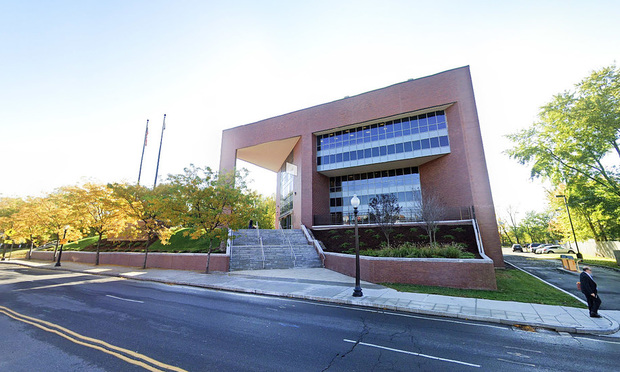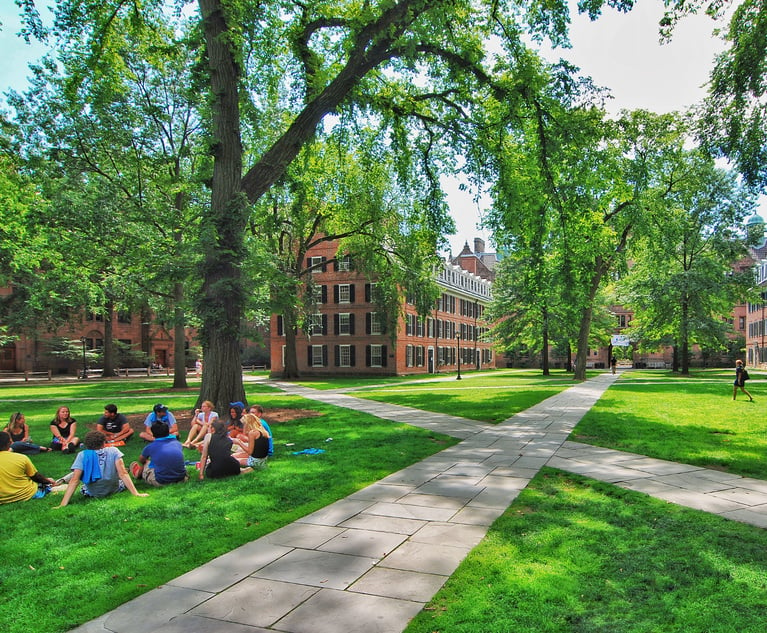Some Connecticut Attorneys Say It's Time to Reopen Courthouses
Several Connecticut attorneys support opening the state's courthouses now, with restrictions. One attorney favors opening courthouses and giving the public the say on what is safe and not.
May 12, 2020 at 05:26 PM
4 minute read
 Danbury Superior Courthouse/photo: Google
Danbury Superior Courthouse/photo: Google
When should the courts in Connecticut reopen?
While many attorneys interviewed this week believe the courts should follow the guidelines of health professionals and open when the COVID-19 pandemic is under control, there are several others who favor opening the courts—to a limited extent—right now.
Pamela Cameron, a partner with Middlebury-based Moore, O'Brien & Foti said she'd feel safe going to court today with several protocols in place. They include pretrials scheduled every 30 minutes; conferences held in a judge's courtroom or in meeting rooms instead of chambers to maintain social distancing; and a requirement that masks be worn.
"There cannot be zero risk in the foreseeable future, but those protocols would minimize the risk substantially, and would allow me to feel safe while still being able to access the courts for my clients," Cameron said. "There is no substitute for the services that the courts provide in managing civil cases, issuing orders and decisions, and working diligently with lawyers on all sides to attempt to resolve cases."
From his perspective, Trantolo & Trantolo attorney Ron Etemi also believes courts should reopen now "on a limited basis for all sorts of civil hearings, including prejudgment remedy hearings."
"They shouldn't be open to the public, but I'd favor scheduling hearings, or even arguments, on civil cases in court for those parties only," said Etemi, who said social distancing should be adhered to and people should be mandated to wear masks and even gloves.
Then, there is the opinion of longtime criminal defense and personal injury attorney Christian Young, who believes that not only should courts be open to the public now, but that people should "incorporate the safety and protocols they feel is important to them."
Young, of counsel at the Bridgeport offices of Cohen & Wolf, said, "My personal opinions might be controversial, but these social distancing requirements and the requirements of wearing masks, in theory, had their potential for usefulness many months ago. As a practical manner, the horse is out of the barn."
Young said imposing social distancing rules in a courthouse is almost impossible "because you have things like elevators and court clerks walking in close quarters with each other."
Young continued: "You just can't keep the country closed. It's impossible."
Young said he has confidence that court employees and visitors using the courthouses would be responsible in interacting with other people. He also said "the courts never closed down during flu season." He noted that each year thousands of people die from flu complications, which has killed between 12,000 and 61,000 people annually across the U.S. since 2010, according to the Centers for Disease Control and Prevention.
But while attorneys might differ on the ideal timing for reopening Connecticut courthouses, most agree that conducting business virtually is the wave of the future.
"We are increasing the remote availability of the courts in areas like the family division, and that's a good thing," said family law and matrimonial attorney Carole Orland of Broder & Orland.
Paul Knag, a partner at Murtha Cullina, said, "You can use technology, like Zoom, for all civil and criminal matters. The technology is there. It's hurting the bar and litigants when you can't move forward with cases."
Related stories:
How the Pandemic Could Change Jurors' Attitudes and Biases
Federal Judicial Clerkship Hiring Process Revamped Due to COVID-19
What Lawyers Need to Know: Court Schedules, Coronavirus Updates
This content has been archived. It is available through our partners, LexisNexis® and Bloomberg Law.
To view this content, please continue to their sites.
Not a Lexis Subscriber?
Subscribe Now
Not a Bloomberg Law Subscriber?
Subscribe Now
NOT FOR REPRINT
© 2025 ALM Global, LLC, All Rights Reserved. Request academic re-use from www.copyright.com. All other uses, submit a request to [email protected]. For more information visit Asset & Logo Licensing.
You Might Like
View All

DC Lawsuits Seek to Prevent Mass Firings and Public Naming of FBI Agents
3 minute read

Trump Administration Faces Legal Challenge Over EO Impacting Federal Workers
3 minute readLaw Firms Mentioned
Trending Stories
- 1Landlord Must Pay Prevailing Tenants' $21K Attorney Fees in Commercial Lease Dispute, Appellate Court Rules
- 2Compliance with EU AI Act Lags Behind As First Provisions Take Effect
- 3NJ's Pardons and Commutations A Model for the Federal System
- 4As Political Retribution Intensifies, Look to Navalny's Lawyers
- 5Family Law Practitioners Weigh In on Court System's New Joint Divorce Program
Who Got The Work
J. Brugh Lower of Gibbons has entered an appearance for industrial equipment supplier Devco Corporation in a pending trademark infringement lawsuit. The suit, accusing the defendant of selling knock-off Graco products, was filed Dec. 18 in New Jersey District Court by Rivkin Radler on behalf of Graco Inc. and Graco Minnesota. The case, assigned to U.S. District Judge Zahid N. Quraishi, is 3:24-cv-11294, Graco Inc. et al v. Devco Corporation.
Who Got The Work
Rebecca Maller-Stein and Kent A. Yalowitz of Arnold & Porter Kaye Scholer have entered their appearances for Hanaco Venture Capital and its executives, Lior Prosor and David Frankel, in a pending securities lawsuit. The action, filed on Dec. 24 in New York Southern District Court by Zell, Aron & Co. on behalf of Goldeneye Advisors, accuses the defendants of negligently and fraudulently managing the plaintiff's $1 million investment. The case, assigned to U.S. District Judge Vernon S. Broderick, is 1:24-cv-09918, Goldeneye Advisors, LLC v. Hanaco Venture Capital, Ltd. et al.
Who Got The Work
Attorneys from A&O Shearman has stepped in as defense counsel for Toronto-Dominion Bank and other defendants in a pending securities class action. The suit, filed Dec. 11 in New York Southern District Court by Bleichmar Fonti & Auld, accuses the defendants of concealing the bank's 'pervasive' deficiencies in regards to its compliance with the Bank Secrecy Act and the quality of its anti-money laundering controls. The case, assigned to U.S. District Judge Arun Subramanian, is 1:24-cv-09445, Gonzalez v. The Toronto-Dominion Bank et al.
Who Got The Work
Crown Castle International, a Pennsylvania company providing shared communications infrastructure, has turned to Luke D. Wolf of Gordon Rees Scully Mansukhani to fend off a pending breach-of-contract lawsuit. The court action, filed Nov. 25 in Michigan Eastern District Court by Hooper Hathaway PC on behalf of The Town Residences LLC, accuses Crown Castle of failing to transfer approximately $30,000 in utility payments from T-Mobile in breach of a roof-top lease and assignment agreement. The case, assigned to U.S. District Judge Susan K. Declercq, is 2:24-cv-13131, The Town Residences LLC v. T-Mobile US, Inc. et al.
Who Got The Work
Wilfred P. Coronato and Daniel M. Schwartz of McCarter & English have stepped in as defense counsel to Electrolux Home Products Inc. in a pending product liability lawsuit. The court action, filed Nov. 26 in New York Eastern District Court by Poulos Lopiccolo PC and Nagel Rice LLP on behalf of David Stern, alleges that the defendant's refrigerators’ drawers and shelving repeatedly break and fall apart within months after purchase. The case, assigned to U.S. District Judge Joan M. Azrack, is 2:24-cv-08204, Stern v. Electrolux Home Products, Inc.
Featured Firms
Law Offices of Gary Martin Hays & Associates, P.C.
(470) 294-1674
Law Offices of Mark E. Salomone
(857) 444-6468
Smith & Hassler
(713) 739-1250










